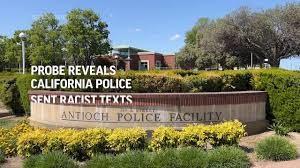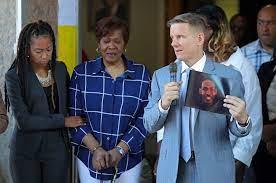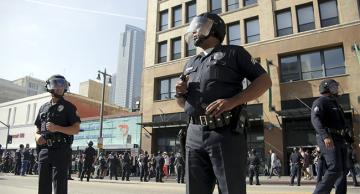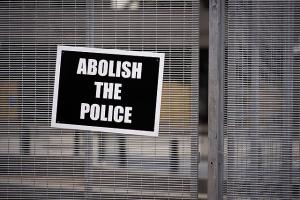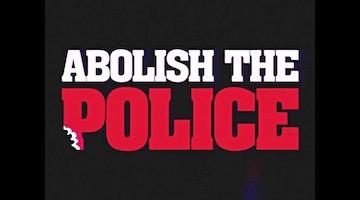Police abolitionists “want a society that works to eliminate harm and promote liberation and self-determination.”
“Police departments maintain order for the rich, shift problems from wealthy areas to poor areas, and respond to preventable harm with violence.”
In this feature, we ask abolitionists a few questions about their work. This week’s featured activist is Derecka Purnell. Purnell is a Skadden Fellow Staff Attorney at Advancement Project.
Can you please tell readers of the Black Agenda Report a little about your background and the work you do?
I am a Skadden Fellow Staff Attorney at Advancement Project (AP), a national multi-racial non-profit located in D.C. that focuses on voting rights, the school to prison pipeline, and immigration. We use movement lawyering, organizing, and communications to build the power of social movements. Last year, AP launched my project, the Justice Project, to support grassroots organizing and movement lawyering around police, prisons, criminalization, and surveillance. The Justice Project has sites in Ferguson, St. Louis, Detriot, and Richmond, and we are exploring partnerships in Puerto Rico, Dallas, D.C., Milawukee, and Miami.
Three weeks before I started law school, Ferguson Police Department Officer Darren Wilson murdered Michael Brown, Jr. a few blocks from my last neighborhood. The Ferguson Uprising became a critical politicizing moment for me. Police officers tear gassed and assaulted people constantly- including me. When I started law school, I wrote, organized, and protested to raise awareness around police violence and racial terror. I studied police, prosecutors, and prisons closely, and was fortunate to have radical lawyers as mentors and comrades that pushed me to think more critically about the law as a violent tool of the state.
Are there any under-reported stories in your community involving prisons, police, or law enforcement that you’d like to share?
I’m currently working on two major projects with grassroots organizers. In St. Louis, I support Action St. Louis with research, training, and legal advocacy. They just unseated Bob McCulloch, the prosecutor who did not bring charges against Darren Wilson. Action St. Louis belongs to a coalition to #CloseTheWorkhouse, a campaign seeking to close the medium security dilapidated jail. I provide similar training, legal advocacy, and organizational capacity building for the Ferguson Collaborative: a group of Ferguson residents who organize around the federal consent decree. They recently pushed the Ferguson Police Department to dismiss thousands of unfair cases in Ferguson, and are now building a campaign for the City to pay back money they stole from Black and poor drivers.
“The police have only gotten more organized in their violence, not less violent.”
Justice Project is also exploring work with grassroots organizers in Puerto Rico, and I am estactic! During our visit, we learned so much about the colony’s history and culture. Hundreds of schools have been closed in an effort to save PR money under the President Obama fiscal control board. Students have protested against tuition increases. The police have violently repressed these protests.
The right-wing government in place has criminalized dissent and free speech, and organizers are facing higher charges. The police department is under a consent decree, but the activists we met said that the police have only gotten more organized in their violence, not less violent. There’s so much to do, and I hope that we can help folks resist.
In your specific context, when are goals of reform and abolition compatible with one another? When do they conflict?
The goals? I don’t think the goals of abolition of reform and abolition are ever compatible. The goal of reform is to improve a system. What does it mean to improve police? Well, it depends. Law enforcement is rooted in slave catching, slave rebellion prevention, and labor organizing suppression. Police departments maintain order for the rich, shift problems from wealthy areas to poor areas, and respond to preventable harm with violence.Do I want the police to get better at being violent—which does not mean that they will be less violent? No. I want a society that works to eliminate harm and promote liberation and self-determination.Those are goals of abolition.
“I have never met an abolitionist whose work does not rely on non-reformist reforms.”
The tactics of reform and abolition may be compatible. But those reforms are non-reformist reforms—they seek to mitigate harm of the current police and prison state without giving more resources to the beast. I have never met an abolitionist whose work does not rely on non-reformist reforms. For example, in Ferguson, the consent decree is a reform process. However, if we can limit the police’s power to fine, surveil, and harm people, then we could use parts of the consent decree tactically to support abolitionist goals.
I usually find that reformers offer the abolitionist vs. reformist dichotomy. Serious abolitionists like Angela Davis, Rachel Herzing, Mariame Kaba, Ruth Wilson Gilmore, Kayla Reed, Keeanga-Yamahtta Taylor, Christina Heatherton, Amna Akbar, Deb Kilroy, Charlene Carruthers, Purvi Shah, Amanda Alexander—they all know that our work encompasses non-reformist reforms.
It’s a lot more likely for state violence to be at the center of one’s analysis if state violence is at the center of one’s experience. That said, what are the most important insights you’ve learned from the people you work with?
State violence is more than police violence. I learned that from my mom. She lives in North St. Louis. She fears police, community based, and domestice violence. There are no walkable grocery stores or clinics. Section 8 housing waitlists are outrageous. Government healthcare might cover your rehabilation treatment or prescriptions, but only the cheapest centers or the medications with the strongest side effects. Schools have closed and the district doesn’t have decision making power. If you self-medicate, you will go to jail. If you go to jail, you lose your Section 8 housing that it took 2 years to get. When you’re homeless, St. Louis Police Department will spray the sidewalk with water in the winter so the ice will stop you from sleeping in front of public buildings. And the city closed the homeless shelter.
“If you go to jail, you lose your Section 8 housing that it took 2 years to get.”
The organizers in St. Louis and Ferguson take genuine care of the communities that they mobilize. They work to meet the immediate needs of people upon their release from jail. They drive through the streets of Ferguson to take people to churches or their own homes when it’s freezing outside. This practice—the genuine care and politicization of our people—is the best of the Black radical tradition. Enslavement resistance, meal prep and shelters for runaways, mutual aid societies, free breakfast programs, community ambulances, books and breakfast, hiring people released from jail and prison—organizers draw from these lessons and practices today.
Are there any new articles or other publications you’d recommend to readers of the Black Agenda Report? (Please include hyperlinks where appropriate)
So much! Between these four lists, there’s a lot to cover.
Critical Resistance
ICOPA’s 2018 Reading List
Prison Abolition Syllabus 2.0
Prison Culture Essential Reading List
What can readers of the Black Agenda Report do to help?
1. Political education
With a partner or a group of people, study issues that you care about and want to change. Read a book and discuss it in person once a month. Create a WhatsApp group or GroupMe to drop articles or music that are related to the topic. Attend an event where you and your group can listen to a speaker on the issue. Learn all sides of the debate. Over the course of the month or year, you and others will become more empowered to challenge problems with what you will learn together.
2. Consider joining an organization.
A group of people who are regularly committed to taking on social justice issues has more power than one individual trying to work alone. These groups can also provide a healing, learning, and protective space after people witness traumatic experiences. Research different groups, talk to members, and learn about the track records of the organizations that you might be interested in before joining. Contribute financially, regularly, if possible.
“Love yourself and your people, keep them close.”
3. Stay hopeful
Talk to your family and friends. Sometimes a phone call or lunch with a friend is better than a Facebook argument that leaves issues unresolved. Consider creating a space and inviting people with different viewpoints to discuss a topic and problem-solve. Brainstorm ideas. Or, just feel free to vent. Main point: there are many ways to have dialogue if you feel comfortable talking about a topic, but do not feel obligated.
But most importantly, be regular. Love yourself and your people, keep them close. Consider visiting people in prison or jail—that you know—in addition to learning and protesting incarceration and police. Show up for people in your life, but maintain a healthy balance so that you can be whole.
In the face of so much state violence today, what gives you hope?
We experience all sorts of state violence, but we also experience lots of other things, too. My hope comes from lots of places. Loud mommas at high school graduations, surprise Beyonce albums, and conversations with that one dude on the block who is smarter than any professor you ever had. Gender-bending Black men. People who experiement with urban farms and new ways of living. Artists. Organizers who recite Frederick Douglass every Independence Day but still know how to show up at a bbq and chill. I got two boys who are equal parts petty and precious. My own politicization gives me hope—I remember when I thought it was okay to be benevolently homophobic. I have come such a long way, and still got a long way to go. But the people in our communities that push us to become more expansive and more beautiful—that’s who and what gives me hope.
Roberto Sirvent is Professor of Political and Social Ethics at Hope International University in Fullerton, CA. He also serves as the Outreach and Mentoring Coordinator for thePolitical Theology Network. He’s currently writing a book with fellow BAR contributor Danny Haiphong called American Exceptionalism and American Innocence: A People’s History of Fake News—From the Revolutionary War to the War on Terror.
COMMENTS?
Please join the conversation on Black Agenda Report's Facebook page at http://facebook.com/blackagendareport
Or, you can comment by emailing us at comments@blackagendareport.com


